 Petzlover
Petzlover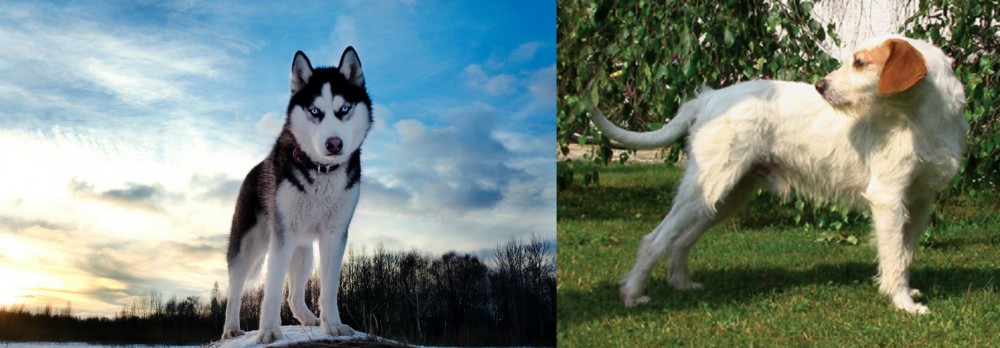 Alaskan Husky is originated from United States but Istarski Ostrodlaki Gonic is originated from Croatia. Both Alaskan Husky and Istarski Ostrodlaki Gonic are having almost same height. Both Alaskan Husky and Istarski Ostrodlaki Gonic are having almost same weight. Alaskan Husky may live 3 years more than Istarski Ostrodlaki Gonic. Alaskan Husky may have less litter size than Istarski Ostrodlaki Gonic. Both Alaskan Husky and Istarski Ostrodlaki Gonic requires Low Maintenance.
Alaskan Husky is originated from United States but Istarski Ostrodlaki Gonic is originated from Croatia. Both Alaskan Husky and Istarski Ostrodlaki Gonic are having almost same height. Both Alaskan Husky and Istarski Ostrodlaki Gonic are having almost same weight. Alaskan Husky may live 3 years more than Istarski Ostrodlaki Gonic. Alaskan Husky may have less litter size than Istarski Ostrodlaki Gonic. Both Alaskan Husky and Istarski Ostrodlaki Gonic requires Low Maintenance.
 Alaskan Husky is created to be a working dog who can do many different jobs like hauling logs, transport, supplies delivery, racing dogs, etc. Mushers created this breed. Alaskan Husky is created as a mix of Inuit dog, Siberian Husky, Greyhound and German pointers, and it is very difficult to find pure breed Alaskan Husky, and they are not recognized by any Kennel club.
Alaskan Husky is created to be a working dog who can do many different jobs like hauling logs, transport, supplies delivery, racing dogs, etc. Mushers created this breed. Alaskan Husky is created as a mix of Inuit dog, Siberian Husky, Greyhound and German pointers, and it is very difficult to find pure breed Alaskan Husky, and they are not recognized by any Kennel club.
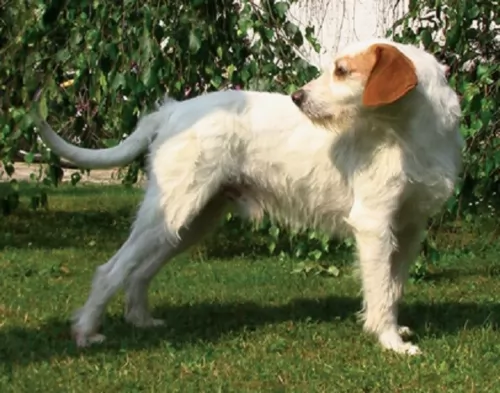 The Istarski Ostrodlaki Gonic, also referred to as the Istrian wire-haired or short-haired scenthound is a very ancient dog breed. Apparently the dog has been found in paintings that go way back to the early 1700s.
The Istarski Ostrodlaki Gonic, also referred to as the Istrian wire-haired or short-haired scenthound is a very ancient dog breed. Apparently the dog has been found in paintings that go way back to the early 1700s.
The dog can either have a short, smooth coat or a rough, wiry longer coat. He has always been popular with hunters, used for hunting rabbits and fox.
An interesting fact with this dog is the correlation between the Dalmatian dog and the Istrian short-haired hound. According to veterinary investigations, there are strong likenesses between the two breeds.
The truth is, the origin of the Istrian has been a matter of dispute for some time but in 2003 the Federation Cynologique Internationale recognized the breed as hailing from Croatia.
 Alaskan Husky average weight depends from dog to dog, but on average male weights 21-25kg, while their height is moderate size. Females are slightly smaller than males, and they can weight 17-19kg.
Alaskan Husky average weight depends from dog to dog, but on average male weights 21-25kg, while their height is moderate size. Females are slightly smaller than males, and they can weight 17-19kg.
A lifespan of Alaskan Husky depends, again, from dog to dog, but it is 10-15 years. Of course, if you are taking care of your dog, they can live much longer.
Litter Size of average female is 4-10 puppies.
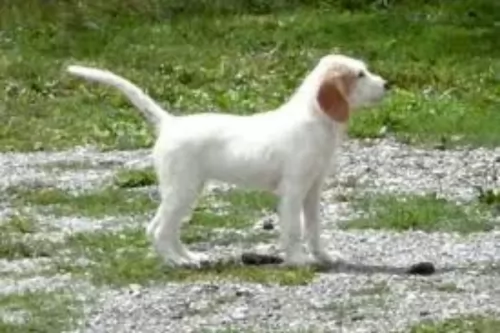 Medium in size, the Istarski Ostrodlaki Gonic stands at roughly 43 to 60cm at the withers and weighs roughly 12 to 27kg. The chest of the dog is broad and deep, the skull slightly rounded while the muzzle is strong and rectangular shaped. The nose is dark brown or black.
Medium in size, the Istarski Ostrodlaki Gonic stands at roughly 43 to 60cm at the withers and weighs roughly 12 to 27kg. The chest of the dog is broad and deep, the skull slightly rounded while the muzzle is strong and rectangular shaped. The nose is dark brown or black.
The ears are floppy and are nearly always in the orange color while the tail is long and is carried low. The coat of the rough haired dog is of medium length. In fact the coat can either be short and smooth or longish and wiry with a woolly undercoat. The color of the coat is white with orange markings.
This breed of dog is sought after for his cheerful personality. He is loyal to his human family and is a social dog, loving to spend time around his family.
He is energetic, confident and strong-willed and this is why, as with most other dogs, he will benefit from training and socialization, as this makes him obedient and responsive to his owner. He is evenly tempered, being gentle and docile.
 Alaskan Husky is the best dog for the active people or families. They are bred to be working dogs. This breed is not created for it looks or pedigree, but this breed is bred purely to help with various tasks. They love being around the family, and they are very happy and cheerful. Alaskan Husky is not good watchdogs because they love everyone, including strangers. They are highly intelligent breed, but it can be tricky to train them sometimes. You must be a leader who makes decisions because if you are not confident, they will not see the reason for listening to you. The best way of training your dog would be with patience and firm, decisive manner. The old-fashioned way of training that includes punishment is not recommendable. They do not respond well to that. Training with awards is the best way to teach your dog. Alaskan Husky is a very active dog, so they are not very good for apartments. Although, you can have them in apartments but only if they have active walks and exercises. They love jogging, and they can be excellent buddies in any activity. They will love all the animals but it is important for them to socialize from the early age.
Alaskan Husky is the best dog for the active people or families. They are bred to be working dogs. This breed is not created for it looks or pedigree, but this breed is bred purely to help with various tasks. They love being around the family, and they are very happy and cheerful. Alaskan Husky is not good watchdogs because they love everyone, including strangers. They are highly intelligent breed, but it can be tricky to train them sometimes. You must be a leader who makes decisions because if you are not confident, they will not see the reason for listening to you. The best way of training your dog would be with patience and firm, decisive manner. The old-fashioned way of training that includes punishment is not recommendable. They do not respond well to that. Training with awards is the best way to teach your dog. Alaskan Husky is a very active dog, so they are not very good for apartments. Although, you can have them in apartments but only if they have active walks and exercises. They love jogging, and they can be excellent buddies in any activity. They will love all the animals but it is important for them to socialize from the early age.
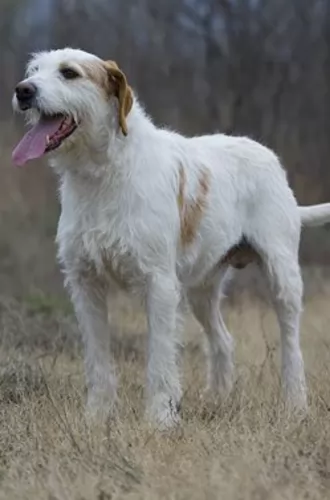 The Istrian Wire-haired Scenthound or Istarski Ostrodlaki Gonic as he is also referred to is a strong, well built hound which is elegant in appearance.
The Istrian Wire-haired Scenthound or Istarski Ostrodlaki Gonic as he is also referred to is a strong, well built hound which is elegant in appearance.
He has a remarkably striking coat - bright white with orange markings. He has always been an excellent hunting dog, even to this day. This background hunting of his will require that he receives ongoing exercise as well as mental stimulation.
Treat this beautiful dog well - exercise him, groom him, feed him well and love him and you will be rewarded with the loyal and devoted friendship of an amazing dog.
 This breed has no any specific health issues. However, as any breed they can develop some issues that are related to genetics. It is very important to discuss with owners that you are getting the dog from, and if they are not ready to show medical records or proofs that dogs are healthy then you should be extra careful. If you do not have a lot of experience in getting a puppy or an adult dog, you should bring someone who has more experience. Again, this breed is very healthy and if you give them adequate caring with regular vet checks you will have a healthy and a happy dog for a long time.
This breed has no any specific health issues. However, as any breed they can develop some issues that are related to genetics. It is very important to discuss with owners that you are getting the dog from, and if they are not ready to show medical records or proofs that dogs are healthy then you should be extra careful. If you do not have a lot of experience in getting a puppy or an adult dog, you should bring someone who has more experience. Again, this breed is very healthy and if you give them adequate caring with regular vet checks you will have a healthy and a happy dog for a long time.
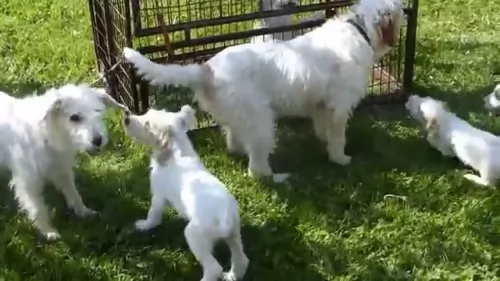 There are people who don’t take dental disease seriously in dogs as they think that it simply affects the teeth, when in fact dental disease can affect the dog’s entire body.
There are people who don’t take dental disease seriously in dogs as they think that it simply affects the teeth, when in fact dental disease can affect the dog’s entire body.
Dental- and gum disease is to be regarded with concern as it can be painful and even life threatening. It affects many dogs, and unfortunately your Istarski is also likely to have problems with his teeth. Tartar build-up and infection of the gums can lead to tooth loss but also damage to the kidneys, heart and joints.
Dogs need to have their teeth attended to regularly and if this is something new to you, speak to your vet and find out about special canine toothpaste and toothbrush and how to use them.
Dogs can be susceptible to bacterial and viral infections such as rabies, distemper and parvo, and that is why visits to your vet are so important. These life-threatening diseases for your Istarski Ostrodlaki Gonic are preventable through vaccinations.
 Feeding Alaskan Husky, or basically any other dog depends on how active your dog is, and how big it is. Basically, if it is big and very active you will have to give it more food. On average, Alaskan Husky can eat 3-4 cups of high-quality dry food and that should be enough to keep them well-fed and healthy. You can always add vegetables, oil or fruits in their meal, but first, consult which additional food is the best for your dog. Carrots, broccoli, apples are always a good treat for any pet.
Feeding Alaskan Husky, or basically any other dog depends on how active your dog is, and how big it is. Basically, if it is big and very active you will have to give it more food. On average, Alaskan Husky can eat 3-4 cups of high-quality dry food and that should be enough to keep them well-fed and healthy. You can always add vegetables, oil or fruits in their meal, but first, consult which additional food is the best for your dog. Carrots, broccoli, apples are always a good treat for any pet.
Puppies eat more than an adult dog, so it would be perfect if you can divide small portions of food 3-5 times per day. It will help them develop into perfectly healthy adult dogs.
They are not very difficult to groom. Overall, Alaskan Husky does not need any special care, except twice a year during shed season. Then you have to brush them with a metal comb every day, but overall, occasional brushing and bathing when it is necessary is more than enough to have a healthy and perfectly groomed pet.
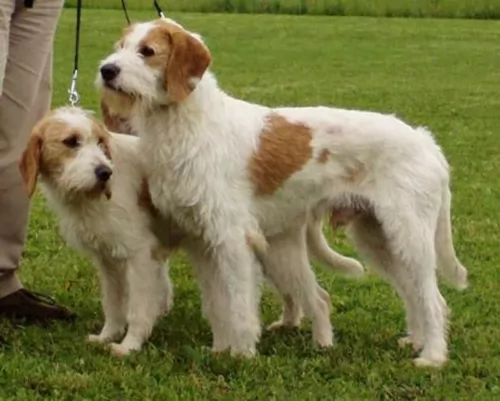 Taking care of an Istarski Ostrodlaki Gonic dog is much like caring for a child – doing everything you can to keep him healthy and happy, after all, he is a member of your family.
Taking care of an Istarski Ostrodlaki Gonic dog is much like caring for a child – doing everything you can to keep him healthy and happy, after all, he is a member of your family.
You want to be watching his diet and making sure that it is the best quality there is, full of vitamins and minerals to keep his eyes bright, his nose wet and his tail wagging.
There are excellent commercially manufactured dog foods on the market today and the best ones ensure excellent nutrition for your dog to keep him in optimal condition through each stage that he goes through. Try to include some home-made food into this kibble such as cooked chicken, brown rice and vegetables and it can be to his benefit to just to include some raw meat from time to time.
Make sure your Istarski Ostrodlaki Gonic is well exercised, that you check his teeth and ears to ensure there are no infections and to call the vet immediately you suspect something is wrong. Make sure you have him examined as a puppy and that he gets his necessary injections as there are diseases that can kill your dog.